Current as of: March 1, 2026 - 14:21
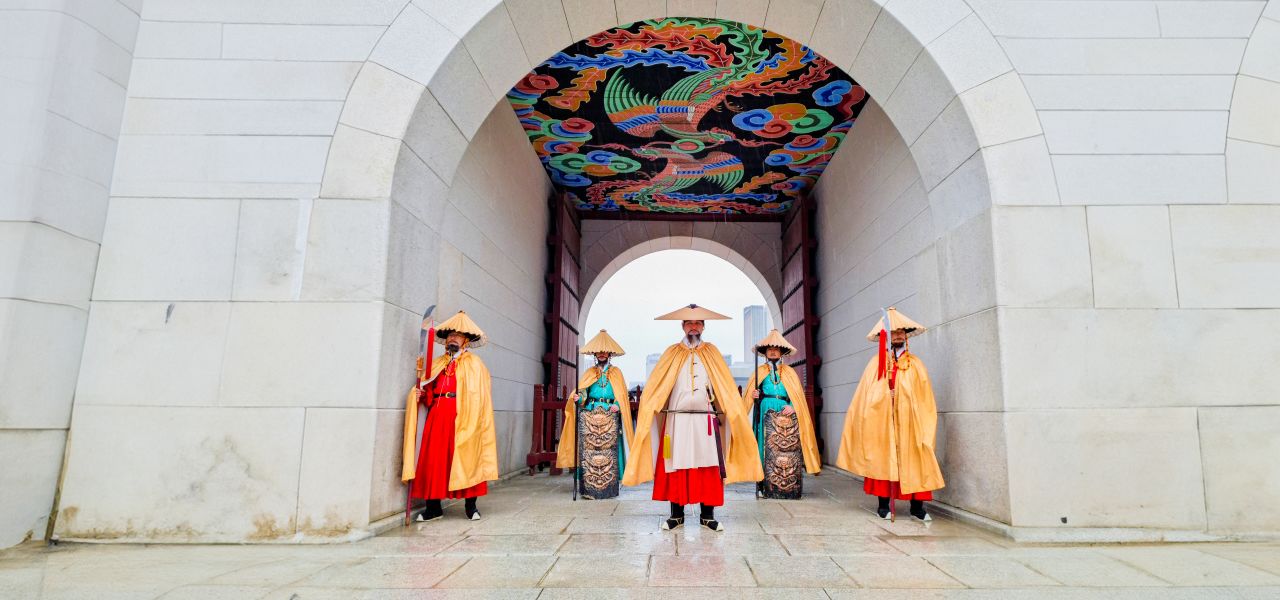
Discover South Korea Trip Notes
- Ways to Travel: Guided Group
- Destination: South Korea
- Programmes: Culture
-
Activity Level:
2 out of 7 - Easy & Moderate
- 12 Days: Land Only
- Ages: 16+
- Trip Code: AOD
- Carbon Footprint: 18kg CO2e
Trip Overview
Explore bustling Seoul, visit the DMZ and see beautiful landscapes in the Land of the Morning Calm
South Korea is a dynamic country, steeped in culture, tradition and history, with vibrant cities, rich landscapes, friendly local people and staggering nature. Join this trip to immerse yourself in the contemporary culture of bustling Seoul, meditate and spend the night in an ancient temple, discover the beauty of Seoraksan National Park and explore the colourful markets of Busan. This, combined with the chance to taste some of the most underrated cuisine in the world, makes a trip to South Korea unforgettable.
Cherry blossom season: Experience the ephemeral beauty of cherry blossom season in South Korea, when the trees bloom with delicate pink blossoms. See the Dates & Prices tab for our special departures.
One of Our Top Recommended Trips for 2026… Here’s Why
K-Pop (and K-Pop Demon Hunters), kimchi, Squid Game… even Baby Shark: the global explosion of Korean culture (or hallyu) is one of the great cultural phenomena of our times. If you haven’t already, then now’s the time to visit South Korea and go beyond the headlines to explore a culture that everyone’s talking about, but few truly experience authentically − Sarah Puttnam, destination expert
Highlights
- Learn about ancient and modern history in Seoul
- Spend a night and join ceremonies at the Unesco-listed Haeinsa Temple
- Visit Panmunjom and the DMZ to learn how Korea was divided
- Discover the bustling, colourful markets of Busan
- Be captivated by the culinary delights of South Korea
Is This Trip for You?
This trip is rated Activity Level 2 (Easy & Moderate). For more information on our trip gradings please visit the Activity Level Guidelines page. If you have any queries about the difficulty of the trip please do not hesitate to contact us.
It is designed to highlight the best of the Republic of Korea (known as the ROK) with a mixture of sightseeing on foot and one short daywalk. Most of our travel is by private vehicle, so the journeys are not physically demanding.
We walk mostly in cities and towns and, although not strenuous, the amount of walking each day can be considerable and fast-paced (we recommend good, comfortable walking shoes). We also ascend and descend a lot of steps. The walk in Seoraksan National Park is optional. For guests who may suffer from claustrophobia, please note that the Third Tunnel (day 3) is a historic site that we may visit requiring a descent into an underground tunnel with narrow passages and low ceilings, offering a unique insight into North-South Korea history.
Adult min age: 16
Min group size: 4
Max group size: 16
Itinerary
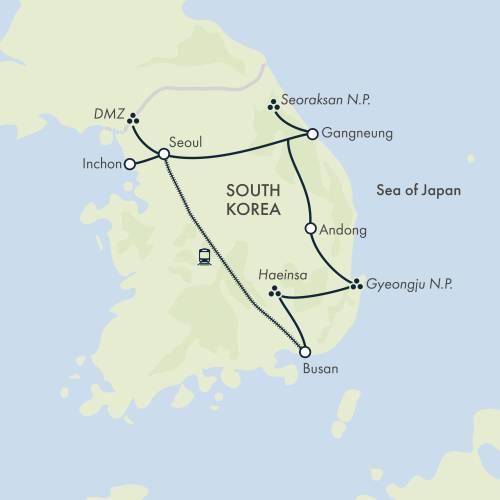
Land Only
- Start City: Seoul
- End City: Seoul
Land Only Itinerary
The adventure begins in Seoul, the buzzy capital of South Korea. Time permitting, the leader will arrange a short orientation tour near the hotel. We can visit Gwangjang Market, one of the oldest food markets in Seoul, where local people meet after work to enjoy traditional foods and liquor. The market also sells vintage clothing and textiles during the day but comes alive in the evenings when unique foods such as bindaetteok, a popular pancake with makkolli, the traditional Korean rice wine, are served.
Around 6pm, say annyeonghaseyo (hello) to your tour leader and fellow travellers, when we gather as a group to get to know each other and learn more about the adventures ahead.
Your tour leader then ensures a big welcome by arranging a group dinner.
Want more time in Seoul? Secure pre-tour hotel nights through your sales representative.
Accommodation: Kukdo Hotel (or similar)
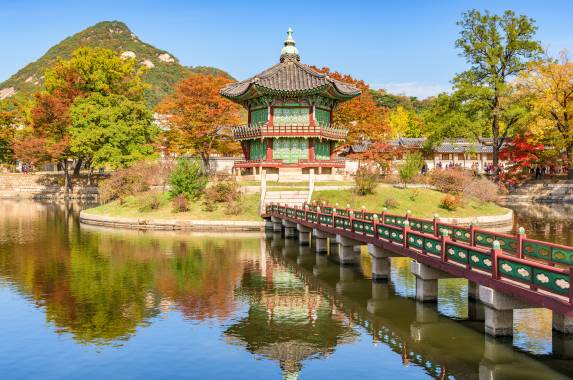
Today we enjoy a walking tour of Seoul. We first head to the Cheonggyecheon, an age-old canal in downtown Seoul that was filled with concrete in the 1960s but reopened in 2005 in its original state. We continue to Tapgol Park, the central point of the Korean independence movement in 1919. From here, we head to Insadong, the artisan neighbourhood where traditional teahouses and souvenir shops are lined up in a cosy, welcoming atmosphere.
After, we visit Jogyesa Temple, one of the most beautiful temple complexes in the heart of Seoul. At Gwanghwamoon, admire impressive statues of Admiral Yi and King Sejong, men who played vital roles in Korean history.
The next stop is Gyeongbokgung Palace. Built by the Joseon dynasty in 1394, this immense complex was the centre of power until Japanese occupation at the start of the last century. At the palace, we may see the changing of guards.
Our last visit today is Bukchon Hanok Village, which is home to hundreds of traditional hanok houses from the Joseon dynasty.
Please note, the order of these activities may change. Although not strenuous, the amount of walking today is considerable and fast-paced (we recommend comfortable walking shoes).
Accommodation: Kukdo Hotel (or similar)
Today we visit Panmunjom, the only place on the peninsula where North and South Koreans can meet face to face. It was here the peace treaty was signed in 1953 and where both parties agreed on a Joint Security Area (JSA) in the middle of the border between the two countries, also known as DMZ (Demilitarized Zone). After a short briefing by US army personnel, we enter the JSA; here we visit Freedom House, the blue barracks sharing a conference room for talks between both North and South Korea, the visitor’s observation post and the Bridge of No Return. En route, we enjoy a traditional Korean dish for lunch.
Due to government restrictions, this excursion is guided by a local JSA-specialised guide and not by your tour leader. The Panmunjom tour may be withdrawn at any time and, in such cases, this trip is substituted with visits to other key areas in the North-South Korea history, such as the Third Tunnel. We must also mention that some nationalities are not permitted to take part in the tour (at the time of writing this includes nationals from Afghanistan, Cuba, Iran, Iraq, Libya, North Korea, Pakistan, Sudan and Syria) and it will be more difficult to obtain permission for South Korean and Chinese nationals to join the tour. Strict rules are in place for DMZ tours and, as such, passport details must be provided in advance. For dual passport holders, please ensure you provide Exodus with the exact passport details you will be entering South Korea with (and will be required to carry on the day tour).
During the tour, it is critically important you follow instructions from military personnel and guides. Please refer to the What to Take section of the Trip Notes for information on required attire for this trip.
The Joint Security Area currently remains closed and could re-open at any time. Entry into the DMZ area itself is open and other key sites such as the Third Tunnel are still possible to visit.
Accommodation: Kukdo Hotel (or similar)
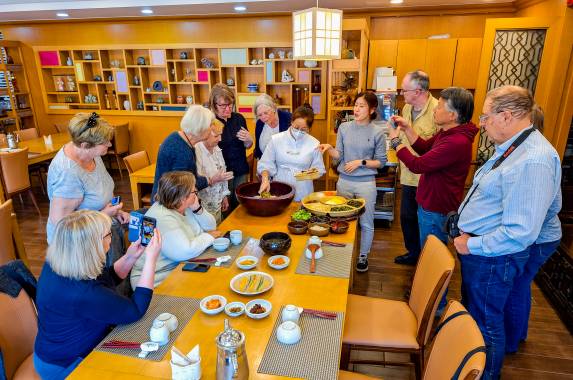
Today begins with a private transfer (approximately three hours) to Gangneung on the east coast. In the heart of Gangwon Province, we visit one of the most picturesque culinary bases in Korea, where all the food is produced and processed naturally and according to centuries-old recipes; fermented food such as kimchi, red pepper paste, doenjang (bean paste) and fish sauce is stored and aged in clay vessels, sometimes for more than five years. Herbs are grown and harvested from gardens, and wild herbs collected from the mountains.
Here we learn how bibimbap is made, a traditional dish of rice with vegetables, herbs, meat and several side dishes. We then lunch on this freshly cooked, healthy food.
In the afternoon, we transfer to Sokcho, a lively coastal city that belonged to North Korea from 1945 until the end of the Korean War.
Accommodation: Sea Cruise Hotel Sokcho (or similar)

On the beautiful east coast, the Seorak Mountains are the most famous in Korea. At the foot of the peaks is an enormous Buddha statue, which acts as a start point for a variety of trails between 2km and 10km (1.25mi and 6.2mi). The leader guides those who wish on an easy and short optional walk. A more leisurely option is to take a cable car to one of the mountaintops to enjoy fantastic views.
Accommodation: Sea Cruise Hotel Sokcho (or similar)
We transfer (approximately four hours) to Andong by private minibus and visit the Andong Hahoe Village, where ancient traditions influenced by the teachings of Confucius are still alive. The inhabitants live in the same way their ancestors did, in simple houses for the common farmers and in richly decorated houses for the yangban (gentry).
Accommodation: Park Hotel (or similar)
We transfer (approximately 2hr 30min) to Gyeongju by private minibus, stopping en route to visit the Dosan Confucian School. In the afternoon, we visit Tumuli Park, which has royal tombs dating to the Shilla dynasty. The numerous artifacts found in these tombs show the remarkable technological and cultural advancement of that period (600 CE to 900 CE). We also visit Cheomseongdae, the oldest existing astronomical observatory in Asia. The 362 stones used to build it represent the 362 days in the lunar calendar.
Accommodation: Commodore Hotel (or similar)
Seokguram Grotto, which we visit this morning, was discovered by a postman sheltering from the rain. Inside the human-made cave, he found an astonishingly beautiful statue of Buddha, constructed during the Shilla dynasty. The grotto is now a Unesco World Heritage site. From here, we visit Bulguksa Temple, constructed in the same period.
This afternoon, we visit the National Museum of Gyeongju, where we can relive the rich and advanced culture of the Shilla dynasty and see numerous archaeological findings. Our day ends with a stop at Anapji Pond, an artificial pond constructed in the royal palace grounds, before exploring Gyeongju Market area.
Accommodation: Commodore Hotel (or similar)

This morning, we transfer to Haeinsa Temple (approximately three hours). It is one of the oldest in Korea and home to the Tripitaka Koreana, the most complete collection of Buddhist texts, engraved on 80,000 woodblocks between 1237 and 1248.
Here we experience a strict Buddhist lifestyle and meet monks dedicating their lives to prayer and meditation. On entering the temple, exchange your own clothes for simple monk clothing and, after the initial introductions and opening ceremony, walk around the beautiful temple complex. After the vegetarian Buddhist dinner, we join a tea ceremony. Lights out at 9pm this evening, ready for our early wake-up.
Please note, during our temple stay, the programme and order in which it runs can be subject to changes. Due to an inclined walkway at the temple entrance, it is recommended to take a small overnight bag in your main luggage to use for the overnight stay at the temple (main luggage will be stored and securely locked in the group transport for the evening) if you wish.
Haeinsa Temple is closed on a Monday and occasionally for local celebrations. If this occurs on a departure, we instead visit Busan on Day 9 from Gyeongju and then travel to Haeinsa Temple from Busan on Day 10, continuing the itinerary and returning to Seoul on Day 11. The departure starting on 18 October 2026 follows this alternative plan.
Accommodation: Haeinsa Temple

We wake at 3.30am to participate in the first ceremony and meditation (please note this is optional). After breakfast at 6am, we depart the temple and transfer to Busan (approximately two hours).
From the impressive Gwangalli Bridge, we can enjoy a breathtaking view of the Busan shoreline. We learn the tragic history of the Korean War (1950-1953) at the UN War Cemetery, then visit the Nurimaru APEC House, a wonderful location with gorgeous views over the ocean. We also visit Jagalchi Fishmarket, one of the largest markets of its kind, to see a dazzling array of fish. Here you can taste Korean sashimi before heading into the adjacent Gukje Market to shop for souvenirs. After dinner, enjoy an optional visit to the Busan Tower (387ft/118m high) for amazing night vistas!
Accommodation: Crown Harbor Hotel (or similar)
This morning, we take a bullet train back to Seoul (approximately three hours) and transfer to our hotel. This afternoon is free for last-minute shopping or to perhaps visit the vibrant Hongdae university district. You may also like to spend your final evening in Seoul exploring the lively nightlife of the Itaewon neighbourhood.
Accommodation: Kukdo Hotel (or similar)
Our adventure ends after breakfast and we begin our return journeys home. Of course, if you’d like to spend a little longer exploring, speak to your sales representative about extending your stay.
Accommodation
Hotels and one traditional temple stay
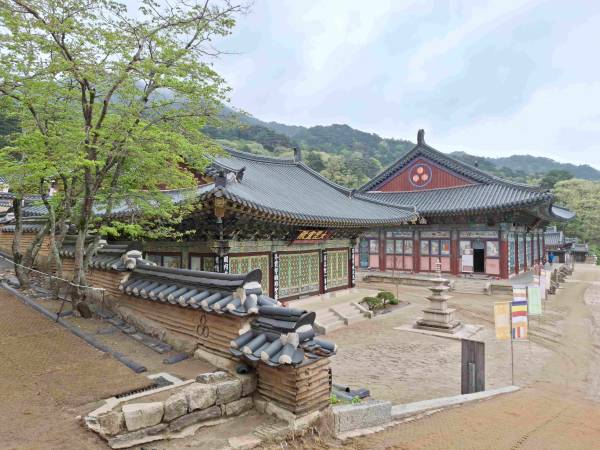
We stay in hotels for 10 nights and spend one night in a traditional Buddhist temple. The normal accommodations used on this trip are on the day-to-day itinerary; however, below are a couple of the notable places we stay.
Seoul: Kukdo Hotel (nights 1-3)
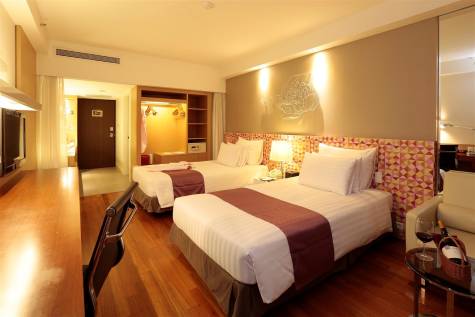
Featuring modern, spacious rooms and a fitness center, Kukdo is in the heart of Seoul, less than a 15-minute walk from the lively Gwangjang Market and easily accessible by public transport from the airport. It has a restaurant serving a buffet breakfast each morning with a selection of Western and Asian dishes, plus a convenience store selling a range of daily necessities.
Mount Gaya: Haeinsa Temple (night 9)
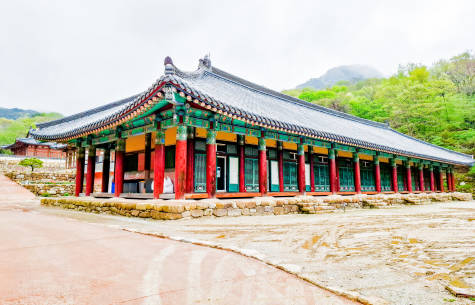
Spend one night in a traditional temple, a unique opportunity to appreciate the life of a Buddhist monk, experience woodblock printing and chamseon, a traditional meditation method of Buddhism in Korea. You may also learn the Buddhist teachings by touring the small hermitages and temples around Mount Gaya with Haeinsa as its main temple. It’s a religious institution, so facilities are basic and rooms are on a triple/quadruple-share basis with Western-style beds and assigned by sex, which means couples are not permitted to share a room.
Worth knowing
- Single supplements can be pre-booked for 10 nights of the tour at the hotel accommodation. These must be requested before departure and are subject to availability. A single supplement is not available for the night at Haeinsa Temple.
Single supplement from USD 1590
Food & Drink
Korean food is generally healthy and based upon rice, vegetables and meats. During the trip, we experience a wide variety of tasty meals including staple foods such as rice, porridge, soups, stews, barbecued or broiled meat and fish along with a large selection of banchan (side dishes) and kimchi (fermented cabbage), which is served at almost every meal.
Transport
Transfers to and from the airport are in a private vehicle (normally a mini-coach). On other days, we mostly use private vehicle transport but also make use of the metro system and bullet train from Busan to Seoul.
Weather & Seasonality
Korea has four seasons, with a wet monsoon/summer season in the middle of the year and a cold winter from November to March.
We aim to avoid the coldest parts of winter and hot-humid summer. Therefore, we visit in spring (late March to May). Cherry blossoms generally bloom at the end of March/early April and autumn (September-November), with a stunning array of foliage colours, warm temperatures and clear skies. Average temperatures during these seasons are 15C-25C (59F-77F). While these are not rainy seasons, the odd shower cannot be ruled out and evenings are cooler.
Joining Instructions
Key information
Start hotel: Kukdo Hotel, 164 Eulji-ro, Jung-gu, Seoul, South Korea
Phone: +82 2-6466-1234
Recommended arrival time: Hotel check-in usually opens at 3pm, but you can arrive at any time today. There will be a welcome briefing around 6pm in the evening.
Airport: Incheon International Airport (ICN)
Getting to the start hotel
The start hotel is approximately one to two hours’ drive (traffic dependent) from the airport. Your options are:
Group transfer
We provide one group transfer from the airport to the hotel, which you can join at no extra cost, provided you can be at the airport before the transfer leaves. Speak to your sales representative for the transfer times or to arrange a private transfer.
Public transport
Take the Airport Limousine Bus No. 6015 and alight at Euljiro 4-ga (Kukdo Hotel) bus stop, the 10th stop after departing Incheon Airport T1 station. Kukdo Hotel is less than a minute’s walk from the bus stop in the direction from which you came. Tickets, which cost 17,000 won (US$12), are purchased at the airport.
Catching your return flight
There’s a group departure transfer to the airport for those booked onto a chosen flight. Please speak to your sales representative if you wish to join. If the group departure transfer does not suit your flight time, speak to your sales representative to arrange an alternative transfer.
Full joining instructions including local emergency numbers will be sent to you as part of our Final Joining Instructions. If you do not receive these at least a week before departure, or require them earlier please contact our office or your travel agent.
Location start: Seoul
Location end: Seoul
What To Take
Essential Equipment
- Casual clothing is all that is required. Outside of business situations, Koreans are very relaxed about dress so formal attire is unnecessary
- On spring and autumn departures, it is possible that some nights outside the main cities are surprisingly cold, so bring a jumper and/or warm jacket and warm trousers (pants)
- As there is a certain amount of walking involved, especially on Day 2, a comfortable pair of walking shoes is a requirement. Ideally these should be easy to put on and take off for the fairly regular occasions when shoes must be removed before entering homes or temples
- Towel and small overnight bag/daypack for overnight temple stay
- Water bottle: Tap water is safe to drink here so remember to bring a refillable water bottle and keep hydrated during the day
Clothing for the DMZ tour
Military policy requires all visitors to display a neat and presentable appearance. There are strict rules on attire for this day and this generally means the following are prohibited:
- Flip-flops, sandals and high heel shoes
- Clothing with profane or provocative text
- Sports or athletic clothing (including gym shorts or track/stretch pants)
- Sleeveless shirts
- Round-neck T-shirts
- Tank tops
- Sheer/provocative or excessively baggy clothing
- Ripped jeans or military-style clothing
Suggested attire for this tour includes flat closed-toe shoes, plain jeans, trousers (pants) or a long skirt, and a plain long-sleeved shirt or T-shirt.
Practical Information
Visa
South Korea
Travellers from the UK, US, Canada and most EU nations normally do not need a visa to enter South Korea.
However, from 1 January 2027, you need to obtain an electronic travel authorisation (K-ETA). To apply for a K-ETA, make sure to do so through the official K-ETA website. Approval generally takes up to 72 hours.
Please note, entry requirements often change and it is your responsibility to obtain any required visas for this trip. Therefore, we recommend that you check with the nearest embassy or consulate of your chosen destination(s), including any countries you may be transiting or transferring through.
Some local governments provide guidance on what visas their citizens need. To help, we’ve gathered a selection of useful links below.
- Australia: www.smartraveller.gov.au/destinations/asia/south-korea-republic-korea
• Canada: www.travel.gc.ca/destinations/south-korea
• United Kingdom: www.gov.uk/foreign-travel-advice/south-korea/entry-requirements
• USA: https://travel.state.gov/en/international-travel/travel-advisories/south-korea.html
Vaccinations and Health
South Korea
There are no required vaccinations. However, you may want to consider vaccinations for tetanus, hepatitis B, Japanese encephalitis, rabies and tuberculosis. Please confirm with your doctor or travel clinic.
Local Time
South Korea's time zone: Asia/Seoul (UTC +09:00)
Electricity
South Korea's electricity: Plug type F (two round pins) – 220V, 60Hz
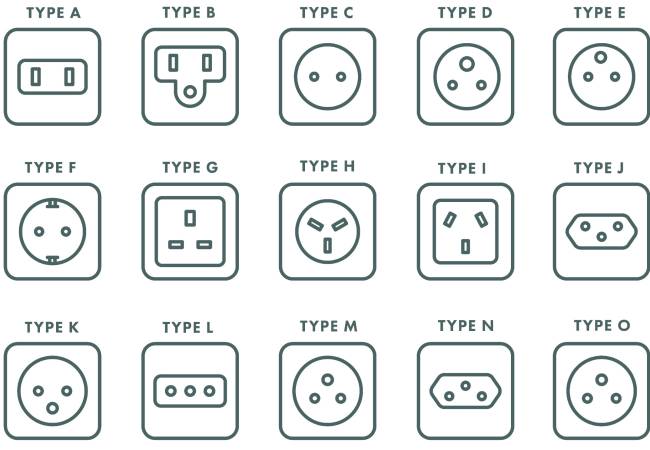
Money
South Korea's currency: South Korean won (KRW)
ATM Availability
ATMs are widely available in large cities such as Seoul and Busan; however, they do not accept all debit cards – please look for those displaying Cirrus or Maestro symbols.
Card and cash payments are accepted, but it is common to us card (debit or credit) for payment in many places now.
Money exchange is available upon arrival at Incheon Airport and in major cities.
Extra Expenses & Spending Money
We recommend you allow approximately 10,000-15,000 won (US$7-US$11) for lunches and 15,000-18,000 won (US$11-US$13) per dinner not included.
We advise travellers to have access to more spending money than they think is needed, rather than less.
Tipping
Local staff are paid fairly for their work. However, you may want to show appreciation for your leader’s services with a tip. The amount is at your discretion but, as a guide, we suggest 5,000-8,000 won (US$3- US$6) per day. Additionally, approximately 3,280 won (US$2.50) per day for your driver if you wish to show appreciation for their services.
Sustainability and Impact
As a certified B Corp, we’re on a mission to improve our social and environmental impact across all our adventures.
We do this through our innovative Thriving Nature, Thriving People plan.
This ‘nature positive’ approach is designed to help nature and communities thrive in harmony through practical solutions, such as reducing carbon and waste on our trips, supporting conservation projects through the Exodus Adventure Travels Foundation, and rewilding 100 square metres for every Exodus traveller.
TNTP Moments
You’ll also find Thriving Nature, Thriving People moments across our trips. These experiences are often a highlight of your adventure, while also benefiting the natural world or local communities.
On this trip, we:
- Stay at Haeinsa Temple to experience Buddhist monastic life, share a vegetarian meal, join a tea ceremony, and meet resident monks.
Important Information
Your Safe Participation
When booking this trip, you should be confident in your ability to participate in all activities described in these Trip Notes. If you have any doubt about your suitability, please call us and ask to speak to one of the experts on this itinerary.
Although our leaders are well trained to deal with different capabilities, if they have any concerns about someone’s ability to safely take part in an activity, or their impact on other people’s enjoyment, we authorise them to take necessary action which, in some circumstances, may involve asking someone to miss that activity.
By booking this trip you agree to our Booking Conditions which clearly state that our leaders have the authority to do this. In these rare instances we will ensure anyone sitting out is safely provided for and offered alternative options where possible. Refunds will not be provided for activities missed and customers may be liable for additional costs incurred.
Seatbelts
All vehicles used by us should be equipped with working seatbelts, except where approved by us based on the vehicle type or journey. Wherever seatbelts are available, we require our customers to use them for their own safety, even where it may not be a legal requirement.
Travel Safety
For additional information please have a look at the travel safety advice page on our website.
How to Book
Speak to our friendly team of experts to plan your adventure:
- Check availability: our website shows real-time availability of our guided group tours, or contact our team by phone, email or live chat.
- Hold a space: You can provisionally hold a space on any guided group tour to give you time to finalise your travel plans.
- Confirm your booking: Payment of a deposit will complete your booking and secure your place on the trip.
After booking
You will receive a confirmation document and invoice, which includes extra information and guidance about your travel arrangements. Our dedicated Customer Operations team will help you with any pre-travel questions or arrangements and can easily add extensions or extra accommodation to your booking. Final Joining Instructions will usually be sent out two to three weeks prior to departure.
Adding transfers to your booking
If you have arranged your own flights and would like to add transfers to your booking, please provide your arrival and departure details to our Customer Operations team around four to six weeks before departure.
- Where free transfers are included, they are available for any flight but can only be added to your booking once we have received your flight schedule.
- Where group arrival and departure transfers are available, these operate at fixed times. You will need to arrive in time to meet the scheduled transfer. If the timings don’t align with your travel plans, our team can arrange private transfers once they receive your flight schedule.
Trip Note validity
Trip notes may be updated after booking; if any updates significantly impact the inclusions or itinerary you will be advised in writing. A link to the most up-to-date Trip Notes will be sent out with your Final Joining Instructions before departure.
The information in these Trip Notes is given in good faith. All holidays can be subject to unexpected changes, and occasionally it may not be possible to follow the itinerary as planned. In these circumstances we will make the best-possible alternative arrangements that maintain the integrity of the original itinerary.

